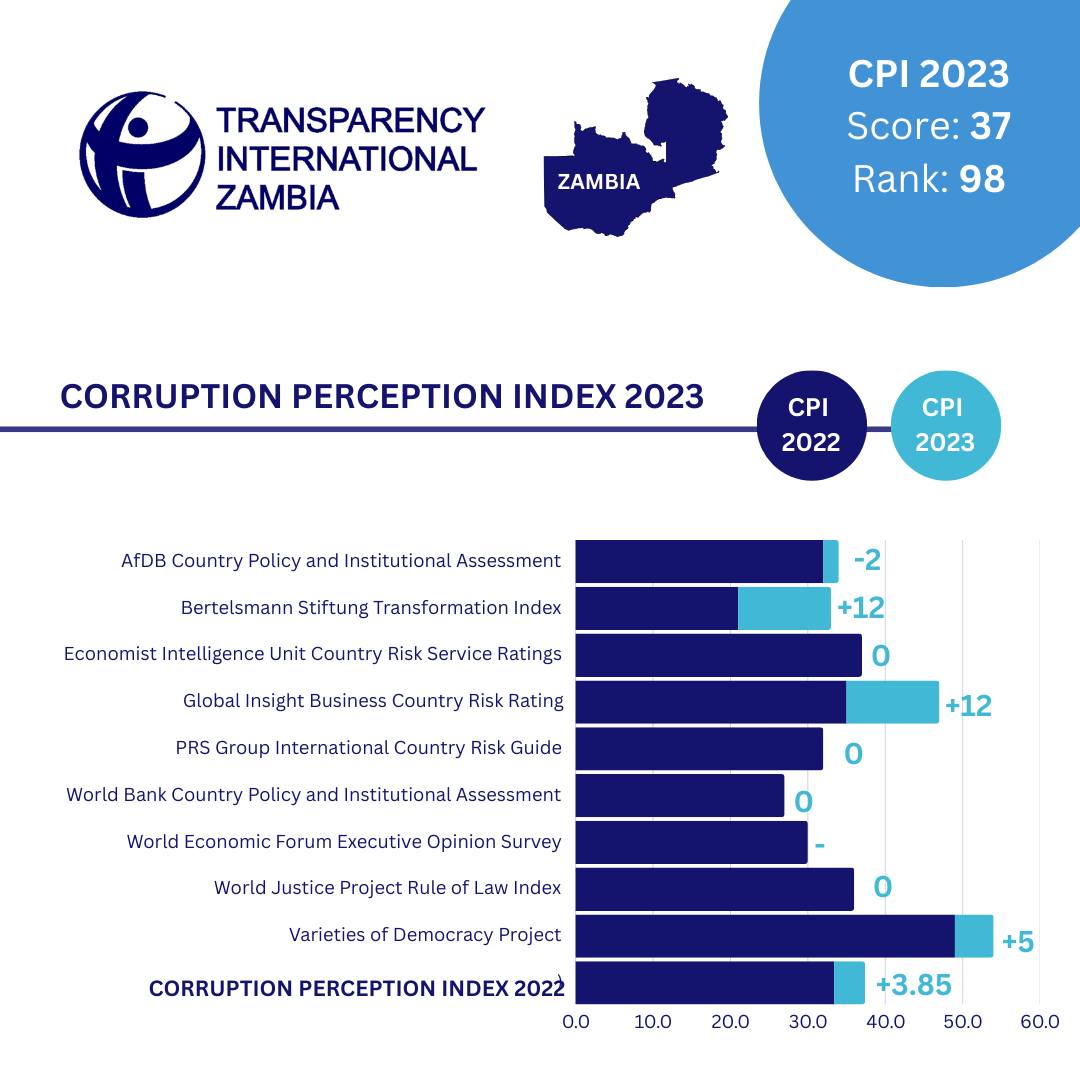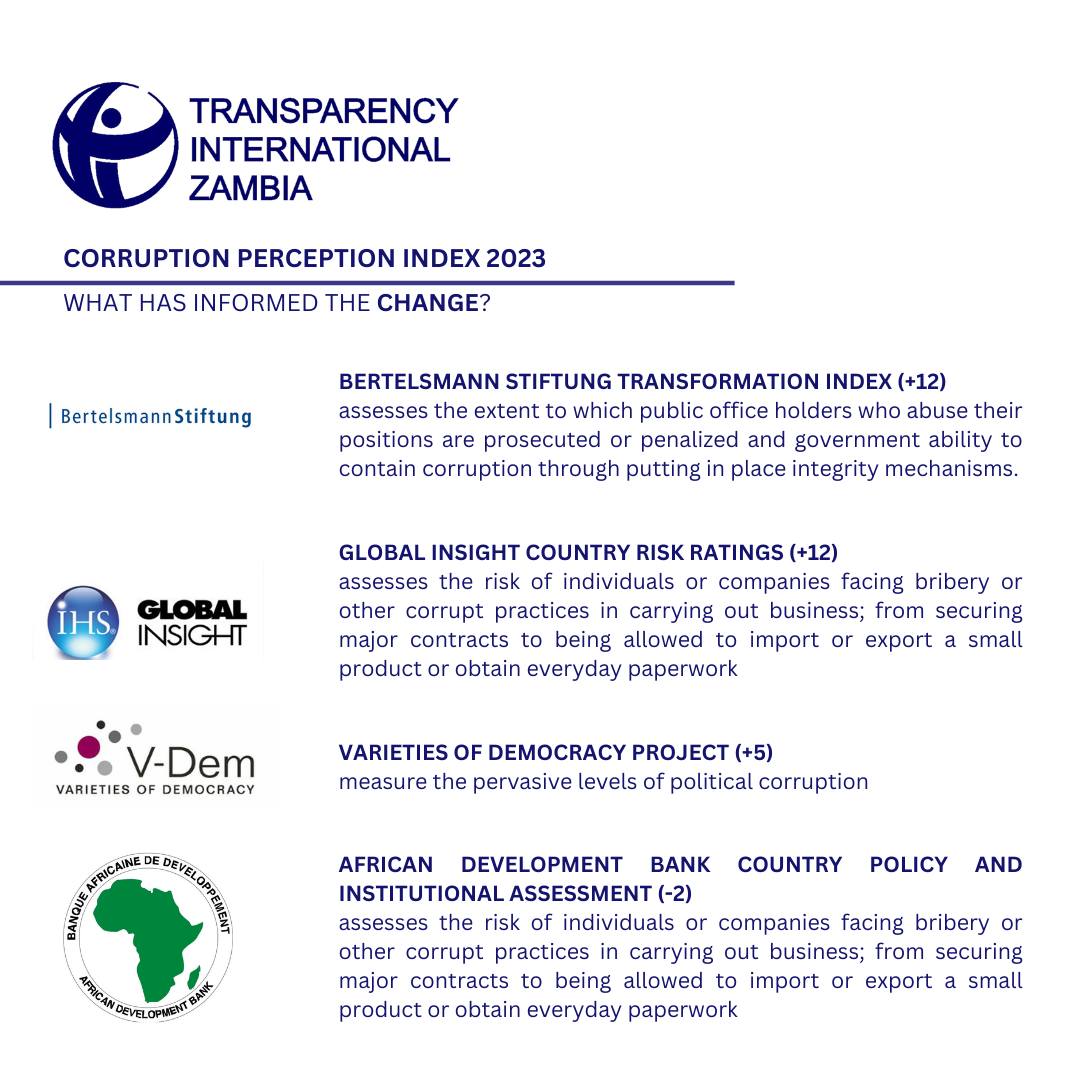
Transparency International Zambia
@ti_zambia
Followers
5K
Following
738
Statuses
4K
#WeDontJustTalk. We are the Zambian Chapter of Transparency International, the global movement dedicated to fighting corruption and promoting good governance.
Lusaka, Zambia
Joined December 2014
On Wednesday, Civil Society Organizations came together for the CSO-Open Government Partnership (OGP) Alliance Planning Workshop at Protea Hotel in Lusaka. Hosted by TI-Z, the workshop provided a platform to reflect on Zambia’s OGP journey, review past commitments, and strategize concrete actions for 2025. Key discussions included leveraging local, regional, and global platforms to advance transparency, as well as upcoming initiatives like the IMF Diagnostic Report Study by TI-Z and the OGP Africa & Middle East Regional Meeting in Nairobi. A big thank you to all participants for their commitment to strengthening open governance in Zambia! Let’s keep pushing for accountability and citizen engagement. 💪
0
0
1
RT @CofZambia: CDF funds are meant to build roads, schools, and clinics, not secret riches for corrupt leaders. Transparency ensures every…
0
3
0
Every year, at the launch of the Corruption Perceptions Index (CPI), we witness some confusion around the CPI and our role in it. So, let’s debunk some of these myths, shall we? The CPI is mathematics: neither TI nor TI-Z are involved in the production of the datasets. TI makes no moral judgement about which country or index to include. It is mathematics. We can’t influence the results. As TI-Z, we simply get to analyse the CPI results and provide recommendations. We have no power to influence Zambia’s CPI performance. Look at the big picture! Year-to-year changes can occur and they don’t always reflect the public’s view, they are compiled on the opinions of experts and business people. But a sustained trend over multiple years can represent a significant trend. Don’t forget to join us for the launch of the 2024 CPI next Tuesday (11/02/25) at 8 AM.
0
0
2
In 2023, Zambia’s CPI score (Corruption Perceptions Index) increased for the first time in 10 years, from 33 in 2022 to 37 in 2023. The CPI measures countries’ perceptions of public sector corruption, assigning a score that ranges from 0 (highly corrupt) to 100 (very clean). Zambia’s CPI improvement in 2023 resulted from improvements in some of the individual data sources that were used to calculate the CPI, mainly concerning prosecution effectiveness, political corruption, and procurement corruption- in particular, the Bertelsmann Stiftung Transformation Index, Global Insight Country Risk Ratings, and the Variety of Democracy Project. Other indexes, however, revealed no marked improvement, which led us at TI-Z to formulate some recommendations. Check our webpage on the CPI to get a better understanding of the CPI 2023 results: Stay tuned for the launch of the 2024 CPI, on Tuesday 11th Feb, at 8 AM CAT.
0
1
5
RT @CofZambia: 𝗔𝗰𝗰𝗼𝘂𝗻𝘁𝗮𝗯𝗶𝗹𝗶𝘁𝘆 𝗶𝗻 𝗖𝗗𝗙 𝘀𝘁𝗮𝗿𝘁𝘀 𝗮𝘁 𝘁𝗵𝗲 𝘁𝗼𝗽. Leaders must declare their assets to prove they work for the people, not themselves…
0
4
0
RT @anticorruption: 🔵 Save the date! We will release the 2024 Corruption Perceptions Index on 11 February. This year's CPI will examine how…
0
32
0
As we get ready for the launch of the 2024 CPI (Corruption Perceptions Index), let’s take a look at Zambia’s recent performance in the index. Last year, Zambia’s CPI score increased by a significant 4 points, reaching the score of 37 out of 100 (where 0 means highly corrupt and 100 very clean). To be clear, this was not the highest score for Zambia – as you can see from the graph below. But it was the first time in a decade that Zambia’s score improved, instead of declining or stagnating. This signaled a promising rupture from the previous negative trend. At the same time, it also called for a set of questions: 🔘what led to such a big change? 🔘Has this been an isolated episode or rather the sign of a change in trend? 🔘What is needed to sustain this positive performance in the years to come? Stay tuned for the results of the CPI 2024, as we unpack these issues with you!
0
0
0
As we get ready for the launch of the 2024 Corruption Perceptions Index (CPI), we want to take a minute to look at what the CPI is and how it is measured. *The CPI is the world’s leading measurement of public sector corruption *It ranks 180 countries and territories around the world based on how transparent their public sector is perceived to be, assigning to each a score that ranges from 0 (highly corrupt) to 100 (very clean). *The scores reflect the views of experts and surveys from businesspeople, not the public. *The scores are derived from external datasets from reputable sources. Transparency International is not involved in the production of any of these datasets. *Check out the video below to learn more about the CPI, and share your questions with us in the comment section below.
0
0
1
The influence of money in campaigns is too big, and too shady. Sometimes money from foreign corrupt individuals with interests in Zambia is channeled into our elections in the form of campaign funding. It is a direct link to state capture: corrupt businesses influence who is in power and obtain illicit favours in return. We need to do something about it! Check our latest article where we explain in detail the main challenges that we face and what we need to do:
0
2
4
Chongwe has made recent headlines, following allegations of illegal land allocation. Chongwe officials have been suspended from performing their duties for 90 days following alleged illegalities in the allocation of land in the district. While the case is still unfolding, for us at TI-Z it is clear that, on a broader level, the land sector is rife with corruption, and that knowledge about land processes and of our rights as citizens is crucial to prevent us from falling victim to land corruption. Learn more about land processes by visiting our portal: And you, how much do you know about land transparency and corruption? Test your knowledge using the link below! The test, which is anonymous, will take only 5 minutes of your time. We are looking forward to receiving your answers! Survey:
0
0
1
According to data from our ALAC (Advocacy and Legal Advice for Citizens) Centre , land was the most affected sector of the economy by corruption according to the corruption reports received, accounting for 30% of all cases. Maladministration was the most frequent typology of corruption reported, mostly involving local authorities. We also received cases of abuse of function and fraud. Check out graphs below to learn more. ❗️ And remember: if you have witnessed an act of land corruption and you haven’t reported it yet, we can assist you! Visit our platform to learn more about how to report corruption:
0
0
1
On the 22nd of January, TI-Z formed part of the National Stakeholder Consultative Workshop on the review of Anti-Corruption Act No. 3 of 2012. This meetup follows Cabinet's approval in principle of the Anti-Corruption (Amendment) Bill, 2024, last year, which was a significant move towards advancing the National Policy on Anti-Corruption. Through a deeper reflection on how the country would strengthen this law, and with the goal to effectively combat corrupt practices and build consensus on the process and content of what needs to be reviewed, we remain positive of this inclusive process culminating into an enhanced anti-corruption law. This will not only address current and emerging issues, but also promote the rule of law, integrity, and accountability.
0
0
0
💡 Debt Transparency and Accountability: A Civil Society Checklist Did you know that debt transparency is essential for safeguarding public resources and ensuring accountability? Transparency International Zambia (TI-Z) partnered with the National Democratic Institute (NDI) to develop a Debt Transparency and Accountability Checklist, providing tools to monitor public debt management, advocate for transparency, and reduce corruption risks. Discover practical insights on how civil society can actively engage in debt oversight, empower communities, and promote fiscal discipline. 📖 Read the full report here:
0
0
1
Food for thought: Land is life. For the most vulnerable among us, losing land means losing the right to life, dignity and identity. Corruption greatly contributes to redistributing land away from the poor and benefitting the rich…. A few months ago, we contributed to @anticorruption ’s report “This beautiful land: Corruption, discrimination and land rights in Sub-Saharan Africa” : As part of the research undertaken for the Zambia chapter, we interviewed several people including civil society organisations, local and traditional authorities, persons with disabilities. These are some of the quotes and testimonies from the people we interviewed. We hope this can make us reflect on privilege and the importance of addressing inequalities in land administration.
0
1
3































